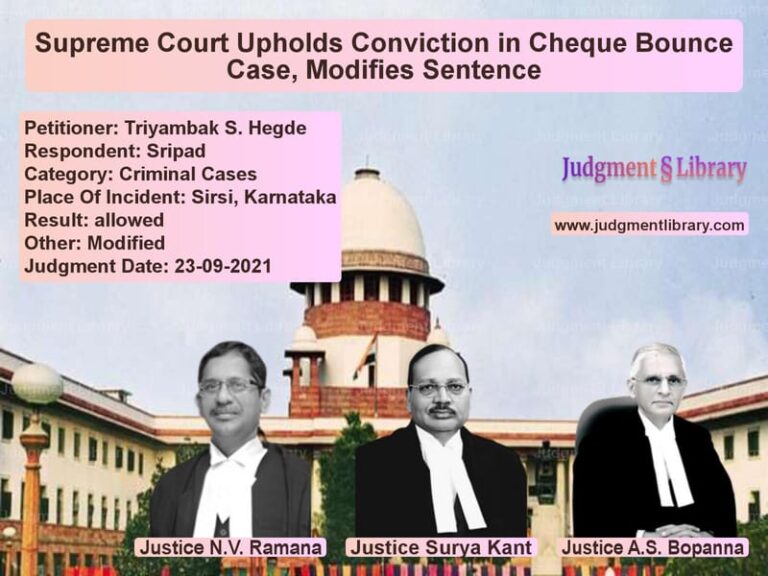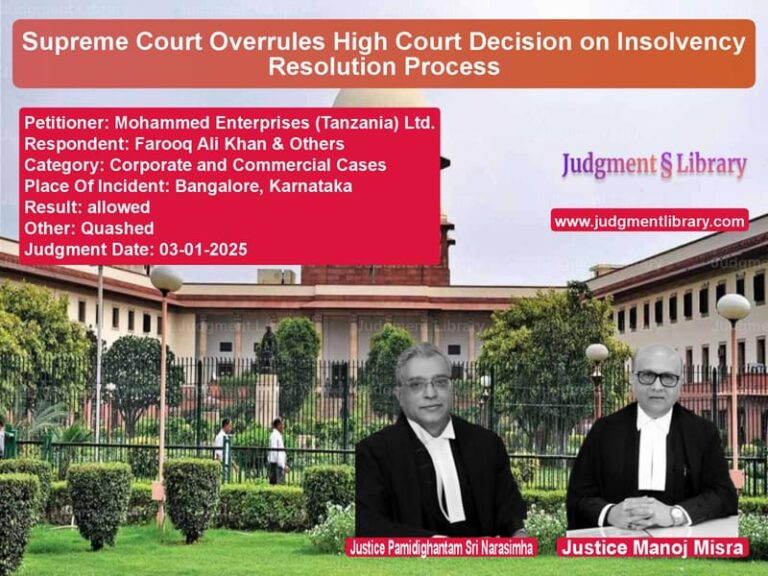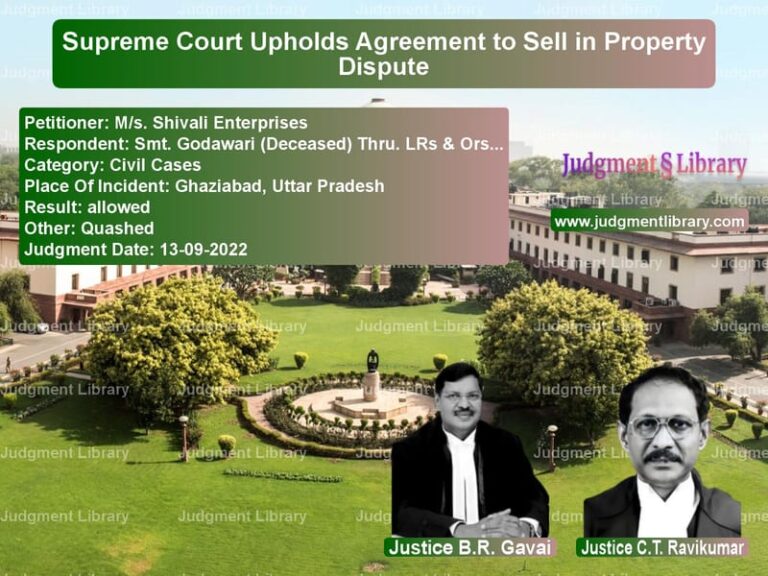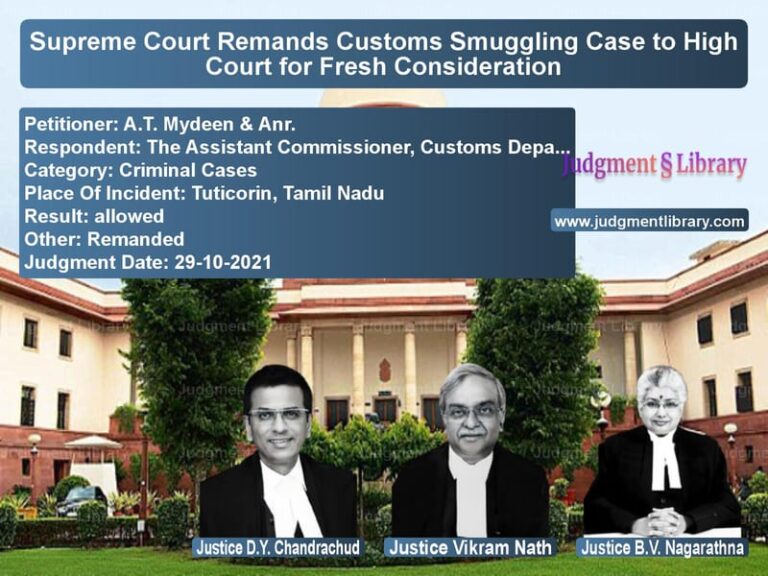Supreme Court Sets Limits on High Court Powers: No Enhancement of Sentence in Accused’s Appeal
In a landmark judgment that clarifies the boundaries of judicial power in criminal appeals, the Supreme Court of India has set aside the enhanced conviction of a man in a suicide abetment case, establishing crucial principles about the rights of accused persons and the limitations of appellate courts. The judgment, delivered by a bench comprising Justice B.V. Nagarathna and Justice Satish Chandra Sharma, reinforces the fundamental legal principle that no person should be worse off for exercising their right to appeal.
The Tragic Background
The case originated from a tragic incident that occurred on July 11, 2003, in Tamil Nadu. The appellant, Nagarajan, was a neighbor of Mariammal, the deceased. According to the prosecution case, on the night of July 11, 2003, Nagarajan entered Mariammal’s room, hugged her, and attempted to outrage her modesty. The disturbance alerted Mariammal’s mother-in-law, who intervened and scolded Nagarajan, causing him to flee from the premises.
The next morning, on July 12, 2003, Mariammal and her one-and-a-half-year-old daughter were found missing from the house. Later investigation revealed that Mariammal had first gone to her elder daughter’s school to take her away, but was prevented by teachers since the warden was absent. She then went to a nearby field with her infant daughter, consumed oleander seeds to commit suicide, and also administered poison to her child. Both were discovered by a passerby grazing cattle nearby. While the child was still alive when found, she was declared dead upon reaching the hospital.
The Legal Proceedings Through Lower Courts
Based on a complaint lodged by the village watchman, FIR No. 239/2003 was registered under Section 306 of IPC (abetment of suicide) against Nagarajan. After investigation, a chargesheet was filed on October 30, 2003. The case was committed to the Mahila Court, Fast Track Court, Dindigul as S.C. No. 54 of 2007.
The Trial Court made significant alterations to the case. It changed the charges from Section 306 to Sections 354 (outraging modesty of woman) and 448 (house-trespass) of IPC. On May 29, 2015, the Trial Court acquitted Nagarajan of the charge under Section 306 of IPC, holding that his actions did not constitute abetment of suicide as he did not instigate Mariammal to commit suicide. However, the court convicted him under Sections 354 and 448 of IPC, sentencing him to three years of simple imprisonment and a fine of ₹25,000 for the Section 354 offense, plus an additional three months for house-trespass.
The High Court’s Controversial Decision
Nagarajan filed a criminal appeal before the Madras High Court challenging his conviction under Sections 354 and 448 of IPC. While admitting his appeal and considering his application for suspension of sentence, the High Court took a surprising turn. Despite the State not filing any appeal against the acquittal under Section 306, the High Court formed the view that the acquittal might require further examination.
The High Court, by order dated June 8, 2015, suo motu directed the registration of a criminal revision case to examine the propriety of the acquittal under Section 306. This was registered as Cri. R.C.(MD) No. 248 of 2015, running parallel to Nagarajan’s appeal.
Read also: https://judgmentlibrary.com/supreme-court-overturns-murder-conviction-in-medical-student-death-case/
In its common impugned judgment dated November 29, 2021, the High Court asserted its inherent power to initiate suo motu revision under Section 401 of CrPC. The court dismissed Nagarajan’s criminal appeal and allowed the suo motu criminal revision, thereby convicting him under Sections 306 and 448 of IPC. The High Court sentenced him to five years of rigorous imprisonment and a fine of ₹5,000 for the Section 306 offense, plus three months for house-trespass. The court observed that Nagarajan had “played an active role in tarnishing the self-esteem of the deceased by outraging her modesty and thereby instigated her to commit suicide.”
The Supreme Court’s Legal Analysis
The Supreme Court began its analysis by emphasizing the fundamental importance of the right to appeal. The Court stated: “That a right of appeal is an invaluable right, particularly for an accused who cannot be condemned eternally by a trial judge, without having a right to seek a re-look of the Trial Court’s judgment by a superior or appellate court. The right to prefer an appeal is not only a statutory right but also a constitutional right in the case of an accused.”
The Court extensively analyzed Section 386 of CrPC, which deals with the powers of appellate courts. The judgment noted: “In an appeal filed by the appellant-accused against the judgment of the conviction and sentence, can the accused be left worse-off while the conviction is affirmed by the appellate court exercising appellate jurisdiction by enhancing the sentence? In such an event, the appellant-accused would be better off, if he either withdraws his appeal or, not to file an appeal at all. But an appeal is not only a valuable statutory right but also a constitutional right in criminal cases.”
The Court made a crucial distinction: “In our considered view, the appellate court in an appeal filed by the accused cannot while maintaining the conviction enhance the sentence. While exercising its appellate jurisdiction, the High Court cannot act as a revisional court, particularly, when no appeal or revision has been filed either by the State, victim or complainant for seeking enhancement of sentence against accused.”
Revisional Powers Under Scrutiny
The Supreme Court carefully examined Section 401 of CrPC, which deals with the High Court’s revisional powers. The Court highlighted that “Sub-section (4) of Section 401 of CrPC states that where under the CrPC an appeal could have been filed and has not been filed, then no proceeding by way of revision could be entertained at the instance of the party who could have appealed.”
Most importantly, the Court emphasized: “What is pertinent is that under Section 401 of CrPC, the High Court is not authorised to convert the findings of acquittal into one of conviction by exercise of revisional jurisdiction. This salutary principle can be extended to also mean that the High Court cannot enhance the sentence imposed by a Trial Court on conviction in an appeal filed by the accused/convict.”
The Court explained the fundamental principle behind this limitation: “In other words, in an appeal filed only by the accused/convict, the High Court cannot suo motu exercise its revisional jurisdiction and enhance the sentence against the accused while maintaining the conviction.”
The Principle of Reformation in Pejus
The Supreme Court invoked the Latin maxim “reformation in pejus” to explain why the High Court’s approach was fundamentally flawed. The Court quoted from Jyoti Plastic Works Pvt. Ltd. vs. Union of India: “It is a latin phrase meaning a change towards the worse i.e., a change for the worse. As a legal expression it means that a lower court judgment is amended by a higher court into a worse one for those appealing it. In many jurisdictions, this practice is forbidden ensuring that an appellant cannot be placed in a worse position as a result of filing an appeal.”
The Court further elaborated: “When the above phrase is prefixed by the words ‘no’ or ‘prohibition’, which would render the maxim as no reformation in pejus or prohibition of reformation in pejus, it would denote a principle of procedure as per which using a remedy available in law should not aggravate the situation of the person who avails the remedy. In other words, a person should not be placed in a worse position as a result of filing an appeal.”
The Court summarized this principle in simple terms: “The rationale of the above can be explained in simple language by stating that no appellant by filing an appeal can be worse-off than what he was. That is exactly what we are seeking to reiterate in our judgment having regard to the facts of the present case.”
Court’s Final Ruling and Legal Impact
The Supreme Court set aside Nagarajan’s conviction and sentence under Section 306 of IPC, while confirming the Trial Court’s judgment regarding offenses under Sections 354 and 448 of IPC. The Court directed Nagarajan to undergo the sentence and pay the fine as originally imposed by the Sessions Court.
The judgment establishes several crucial legal principles that will guide future criminal appeals. First, it reaffirms that the right to appeal is both a statutory and constitutional right that cannot be undermined by making appellants worse off for exercising it. Second, it clearly delineates the boundaries between appellate and revisional jurisdiction, preventing courts from using one to achieve the objectives of the other. Third, it reinforces the principle that enhancement of sentence can only occur in appeals filed by the State, victim, or complainant, not in appeals filed by the accused.
This judgment serves as an important safeguard for accused persons, ensuring that the exercise of legal rights doesn’t become a gamble where they might end up with a worse outcome than if they had accepted the original judgment. It maintains the balance between the State’s interest in punishing crime and the individual’s right to a fair legal process, ensuring that the scales of justice remain evenly balanced in criminal appeals.
Petitioner Name: Nagarajan.Respondent Name: State of Tamil Nadu.Judgment By: Justice B.V. Nagarathna, Justice Satish Chandra Sharma.Place Of Incident: Tamil Nadu.Judgment Date: 03-06-2025.Result: partially allowed.
Don’t miss out on the full details! Download the complete judgment in PDF format below and gain valuable insights instantly!
Download Judgment: nagarajan-vs-state-of-tamil-nadu-supreme-court-of-india-judgment-dated-03-06-2025.pdf
Directly Download Judgment: Directly download this Judgment
See all petitions in Judgment by B.V. Nagarathna
See all petitions in Judgment by Satish Chandra Sharma
See all petitions in partially allowed
See all petitions in supreme court of India judgments June 2025
See all petitions in 2025 judgments
See all posts in Criminal Cases Category
See all allowed petitions in Criminal Cases Category
See all Dismissed petitions in Criminal Cases Category
See all partially allowed petitions in Criminal Cases Category

